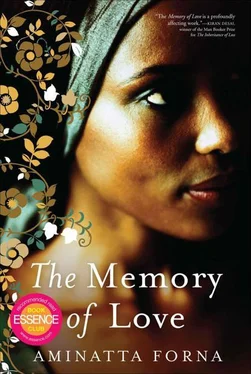Adrian stands up and moves towards her; he wants to take her in his arms. ‘I imagine it took great courage,’ he says.
She moves away, as though his touch would burn her. From the other side of the verandah she looks at him and laughs humourlessly. ‘Oh of course, the new orthodoxy. Everyone’s a victim now. It’s official. But you see, that’s where you’re wrong, Adrian. Courage is not what it took to survive. Quite the opposite! You had to be a coward to survive. To make sure you never raised your head above the parapet, never questioned, never said anything that might get you into trouble.’
‘I see what you’re saying. But still, they could have got the information from somewhere else.’
She turns to look at him, a pitiless look he has never seen before. ‘Everyone talks about they. Them. But who is they ? Who are they ? People like Johnson? Paid to do the things they do? Or the people who help them along, who keep their mouths shut and look the other way? My father survived. No, he didn’t just survive, he thrived! And there came a point’ — she takes a deep breath, wraps her arms around herself and half turns away — ‘there came a point I had to ask myself, how could that be?’
With the tips of his fingers Adrian kneads his brow and sighs. This is not what he wanted, to argue. Mamakay continues. ‘Sometimes I think this country is like a garden. Only it is a garden where somebody has pulled out all the flowers and trees and the birds and insects have all left, everything of beauty. Instead the weeds and poisonous plants have taken over.’
Adrian is silent for a moment and so is Mamakay. Then he says tiredly, ‘I’m a psychologist. It’s not my place to make moral judgements. I heal sick minds, or at least I try to. What I don’t do is judge them.’ He intends his words to calm her, to signal a retreat.
‘Who was it who said “History will be kind to me, for I intend to write it”?’
‘Churchill,’ says Adrian. ‘Winston Churchill.’
‘He’s using you to write his own version of history, don’t you see? And it’s happening all over the country. People are blotting out what happened, fiddling with the truth, creating their own version of events to fill in the blanks. A version of the truth which puts them in a good light, that wipes out whatever they did or failed to do and makes certain none of them will be blamed. My father has you to help him. You’re just a mirror he can hold up to reflect a version of himself and events. The same lie he’s telling himself and everyone else. And they’re all doing it. Whatever you say, you will go away from here, you will publish your papers and give talks, and every time you do you will make their version of events the more real, until it becomes indelible.’
And in Mamakay’s words Adrian hears the echo of his own thoughts of earlier in the day, only differently stated. The silent lie.
Past midnight Adrian lies with Mamakay in his arms. They have made love not once but twice. He is grateful. Her anger is finally gone. It is too hot to be so close to another human body and yet he will not let go. Only when it becomes unbearable does she finally break free, roll on to her back and say, ‘There is something I need to tell you.’ She never whispers, not even in the dark. ‘I am going to have a child.’
‘Worked for Byron,’ says Seligmann. ‘Nothing women love more than a limp. Brings out their maternal side. What do you say we just fix the one? Leave the other. He’ll thank us. Find a wife faster than he can run.’
With his leave due, Seligmann is uplifted. A whole month at home by the end of which Kai knows he will be bored and fractious as a toddler. Seligmann’s contract with the hospital has just been extended, too. Kai knows the reason why, even though Seligmann still does not.
‘What do you say, Jestina?’ Seligmann wiggles his eyebrows and winks at the new nurse over the top of his mask.
Jestina giggles through her mask and stares at her toes.
‘A club foot, it’s a high road to fame and fortune,’ continues Seligmann. ‘Emperor Claudius, Dudley Moore.’
‘Goebbels,’ says Kai.
Foday lies between them on the operating table, his entire body swaddled in green surgical cloth, his left calf and foot exposed. Seligmann flexes the foot this way and that, gives each toe an experimental pull. He turns around to gaze at the X-rays on the board and then bends down to peer closely at Foday’s foot.
‘This could take a little time. We’ll fix that knee now, as we agreed. And get the big tendon done. That should be straightforward enough. Then go inside the foot and loosen off some of those ligaments. If we need to play around any more we can do that when we begin on the other one. That’s a few months away, at any rate.’ He tickles the underside of Foday’s foot. ‘No giggles? Good. Dreaming of angels. Houston, we have lift-off!’ And he slips his scalpel through Foday’s skin.
Mrs Mara took the news of Kai’s leaving better than Kai dared to imagine. She wished Kai luck with his future career and told him she never expected to hold on to him, only hoped that she would, and finally promised to help in any way she could with his application. It had been that bad.
Her short-term solution was to approach Seligmann and ask him to stay for another six months, in which way she’d averted an immediate staffing disaster. But Seligmann is in his seventies, long retired, working for the love of orthopaedic surgery. He can’t stay on for ever.
Two and a half hours later they have completed work on the knee and the Achilles tendon. The real work would begin in physiotherapy, of which Foday has months ahead of him. Seligmann whistles Elvis’s ‘Love Me Tender’ as he leans forward and inspects the inside of Foday’s foot. ‘Hello,’ he says. ‘What do you say we try switching these two tendons around?’
Kai nods. The day is coming soon when he will have to tell Seligmann that he plans to leave. Seligmann, who loves his work here almost as much as he loves his own wife.
Late in the afternoon Kai climbs the hill in the garden of the old house. He needs to call his parents, see what they want to do, whether rent it out or board it up. So far there have been no thieves, not counting the looters during the first invasion when his parents still lived there. This time he notices a broken window at the back of the house. And it looks like people have been climbing the wall of the garden — to collect firewood and fruit from the trees, very likely. The garden is overrun. The grass has grown so high as to obscure the fact of the terraces. It reaches halfway up the trunks of the candelabra trees. Kai pushes his way towards the verandah, swings himself up and over the low railings. Coming straight from the hospital he has no key. He wanders around the side of the house. At the corner he stops. There are scorch marks on the marble floor. An empty Peak Milk tin rolls in and out of a corner. The big metal kitchen door stands ajar. Silently he moves forward and enters the kitchen. There is the cooker. The fridge is gone. Old newspapers and plastic bags fill the sink. Kai tries a tap, nothing. Idly he tries a light switch, and is amazed when the bulb flickers on.
The house smells of mildew and dust. The door of the master bedroom is missing. Inside the bedroom a mattress lies on the floor, a great scorch mark like a black petalled flower at its centre. Kai tries the drawers of the dresser. For the most part they are empty; inside one he finds an old prescription and in another a single gold earring in the shape of a swallow. He recognises it as belonging to his mother and puts it in his pocket. He checks the bathroom and then the other rooms one by one.
Читать дальше












